I tried to upload the images I shot and Blogger completely messed them up, so I've linked the photos below to my Flickr account, so if you click on a photo, it will go to my Flickr site.
Anyway, I managed to catch some good shots of the Milky Way, including some with meteors streaking through them. I also snapped Jupiter with the Milky Way; the Milky Way with Cassiopeia, the Andromeda Galaxy and a meteor streaking by; Jupiter and the Milky Way, Andromeda and the Pleiades; and the Pleiades with aurora. I also got a jet flying through a Milky Way picture. That was kind of neat.
I should also mention that all of these photos were taken using only a Nikon D90 with an 18-55mm lens on a tripod.
The photo below is of the Milky Way and a meteor streaking by just to the right of center.
Here is the same shot with a little different editing. It hopefully appears lighter.
Here is another attempt at the same photo to edit it so it's brighter.
This photo is photo of the Milky Way with a jet flying through the photo. I thought it was kind of neat.
This photo is of a brief appearance of the aurora.
This is more of a close-up of the Pleiades.
This is a wide angle shot with the Pleiades toward the bottom just to the right of center.
This photo has the Milky Way going down the middle of it, with Cassiopeia in the middle of the picture. The Andromeda Galaxy is to the right of center and about one third of the way from the right side of the photo. It looks like an orangey, fuzzy ball.
This photo has a meteor in it toward the bottom just right of center.
This photo has Cassiopeia in the middle toward the top, with Andromeda to the right of that and a meteor toward the lower left.
This is a wide angle shot with the Pleiades in the lower right.
This photo has Jupiter shining bright on the lower left and the Milky Way on the right side.
Here is the same photo with different editing.
This one has the Milky Way running down the middle with two meteors forming a V about one third from the right side, just above the middle.
This photo is of Jupiter and four of its moons.
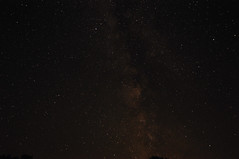

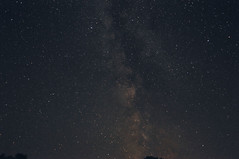

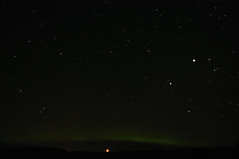

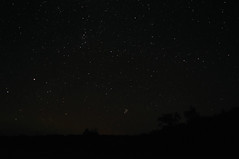


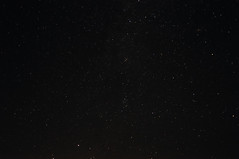








Hey Colin, I can't see a whole lot on my CRT screen, thats why I usually adjust my shots on my CRT and not my LCD, I see the jet thats about all.
ReplyDeletehmm. Weird. Also, there is definitely a difference between the photos my camera takes and the ones yours can take. I must say I'm almost more impressed with your camera's night photo ability over mine. I'll see what I can do to adjust these better. Thanks for pointing that out.
ReplyDeleteHey Colin, they do look better on my LCD laptop screen, they should be lighter though, what is your fstop set at, that is the only thing I can figure, or you might try 60 second exposures on the aurora and Milky Way with a 1600 ISO.
ReplyDeleteI'm finding a horrible amount of noise at higher f-stops. I'll try to do longer exposure time, but risk star trails. Oh well, I'll keep playing I guess. Thanks for the tips. By the way, I used 1600 ISO and tried a number of f-stops between 3.5 and 14. Also, used anywhere from 15-30 seconds.
ReplyDeleteColin, it is amazing how much we can underestimate the sky at night. So much to discover. Thanks for sharing. BTW the more I look at the Aurora, the more I see moving green light, so so cool. Anna :)
ReplyDeleteThanks Anna. I love sharing my photos (when they work out of course). The Aurora effect is rather neat I think. I really wish I could live in the country sometimes just for the night sky.
ReplyDelete